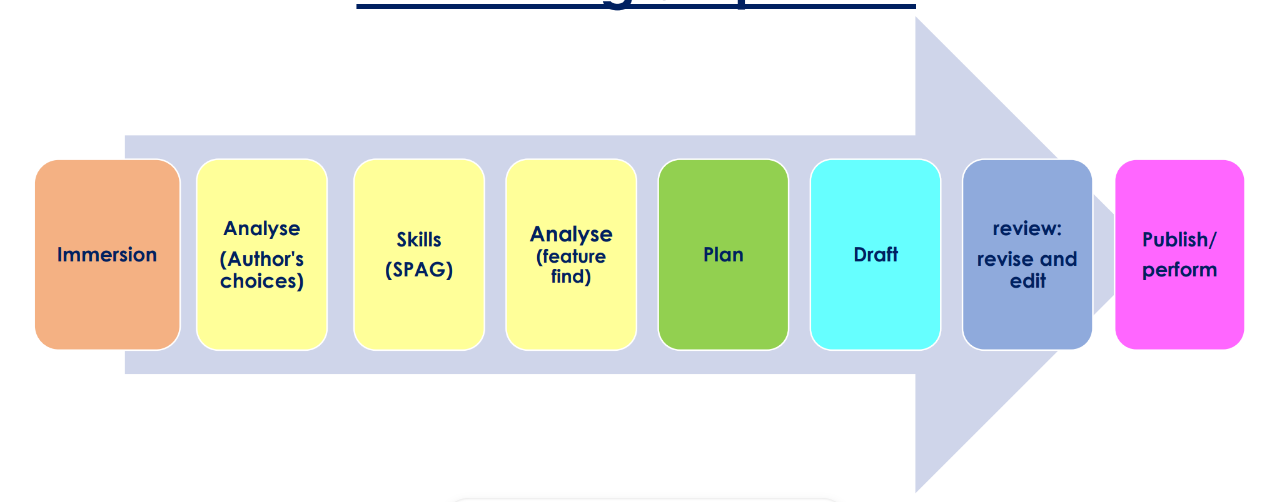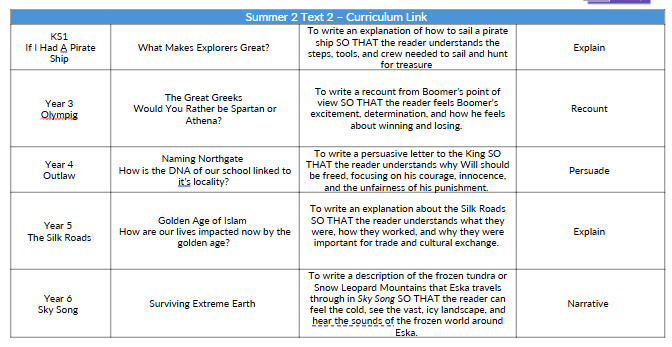Writing
Writing at DNA
At Djanogly Northgate Academy, we believe writing is an essential life skill that enables children to express themselves creatively and communicate clearly in all areas of life. Our writing curriculum is designed to inspire and engage children, helping them develop into confident, independent writers who can share their thoughts with clarity and purpose. We want every child to leave school with a love for writing, the ability to write fluently, and the skills to write for different purposes and audiences.
Intent
We believe writing is key to a child’s success. Our aim is to nurture creativity, encourage self-expression, and build academic confidence. We understand the importance of clear communication and aim to help our children become confident, purposeful writers.
Our writing curriculum balances technical accuracy with creativity. We teach grammar, punctuation, spelling, and sentence structure, while guiding children to write with intent—selecting vocabulary, tone, and punctuation to suit their audience and purpose. Every piece of writing is crafted to communicate a specific message.
We embed our core values into every writing lesson:
- Discover: Exploring different writing styles and genres to deepen understanding of language and expression.
- Nurture: Creating a safe, supportive environment where children feel confident expressing themselves through writing.
- Aspire: Encouraging children to take pride in their work and become independent writers who communicate their ideas effectively.
We also celebrate writing by providing opportunities for children to share their work both in school and with the wider community. Writing is shared with real-life audiences, and children receive meaningful feedback on how their work impacts readers.
Our approach to teaching writing is structured and progressive, ensuring that every child builds a strong foundation in both the technical and creative aspects of writing.
Early Writing
- In the Early Years, we use Drawing Club by Greg Bottrill to inspire writing and develop early writing skills. This approach encourages children to draw, imagine, and create characters or stories to write about. It builds confidence and creativity in a fun, engaging way.
- Writing is also encouraged through high-quality enhancements in the learning environment. We weave writing into children’s interests and engage them in mark-making, storytelling, and expressing their thoughts in writing, based on their observations and experiences.
- In EYFS and Key Stage 1, children focus on phonics, spelling, and handwriting, using phonetic knowledge to build confidence and fluency in writing simple words and sentences.
Key Stage 1
We follow the Priority Literacy approach, supporting children to build foundational transcription skills and become fluent writers by the end of KS1. In Year 1, we focus on transcription using a structured approach known as 'dicated sentences':
5 Steps of Dictated Sentences
- Read and Practise Letters
Children read a simple sentence aloud (with pictures to help if needed) and practise correct letter formation underneath. - Build and Copy the Sentence
Pupils reorder a cut-up sentence and copy it, improving sentence structure understanding and handwriting. - Listen and Write
The teacher dictates a sentence. Pupils repeat, count the words, and write it while receiving live feedback. - Add More Detail
Pupils expand the sentence using techniques like expanded noun phrases or conjunctions. - Write Their Own Sentence
Pupils continue the sentence independently. Teachers provide support for challenging words to maintain fluency.
After Writing – Self-Check
Children compare their work to the teacher’s model and edit any errors. This builds accuracy and editing skills.
As pupils move into Key Stage 2, their writing skills are extended further. They are taught to write for a specific effect or ‘SO THAT’.
Example: “To write a report on the legacy of the Windrush generation SO THAT the reader is inspired by their contributions to modern Britain.”
We guide children through a structured writing process that supports each stage of their development:
- Immersion: Pupils explore the topic through rich experiences such as stories, videos, role play, or drama. This builds vocabulary and clarifies purpose and audience.
- Analyse (Author’s Choices): Children examine how authors use language and structure for effect. They begin applying these techniques to their own writing.
- Skills (SPAG): Focused teaching of spelling, punctuation, grammar, and sentence construction in context, tailored to the genre and ‘So that’
- Analyse (Feature Find): Pupils study examples of writing (WAGOLLs – What A Good One Looks Like) to identify key genre features and build success criteria.
- Plan: Pupils organise ideas using tools like story maps, boxing up, or bullet points, ensuring logical structure and coherence.
- Draft/Write: Children create their first drafts using their plans and the techniques they’ve learned. Teachers provide modelling and support.
- Review: Revise and Edit: Pupils improve their work by refining content (revise) and correcting grammar, punctuation, and spelling (edit). Feedback may come from peers, teachers, or self-assessment.
- Publish/Perform: Final versions are presented neatly or performed, allowing children to take pride in their work and share it with others.

Carefully Selected Writing Tasks
Our writing curriculum provides children with a rich exposure to language and literature, reflecting both our school’s diversity and enriching our children's cultural capital:
- Writing Curriculum Overview ensures writing tasks are purposeful, aligned with the national curriculum, and build on previous learning.
- Unit plans provide guidance for teachers re what to include to teach a specific 'So That'
- Short-term plans give teachers clear objectives and ensure lessons are focused and structured.

By the time children leave Djanogly Northgate Academy, they will have:
- A lifelong love for writing and confidence in self-expression.
- Strong skills in grammar, spelling, and punctuation to write clearly and effectively.
- The ability to write for a range of purposes and audiences with clarity and creativity.
- A rich, diverse vocabulary to support communication.
- A secure understanding of the writing process—from planning to publishing.
Our structured writing curriculum helps children learn more, remember more, and succeed in the next stage of their education. By the time they leave us, our children are skilled, thoughtful, and enthusiastic writers—ready to engage with the world around them.
